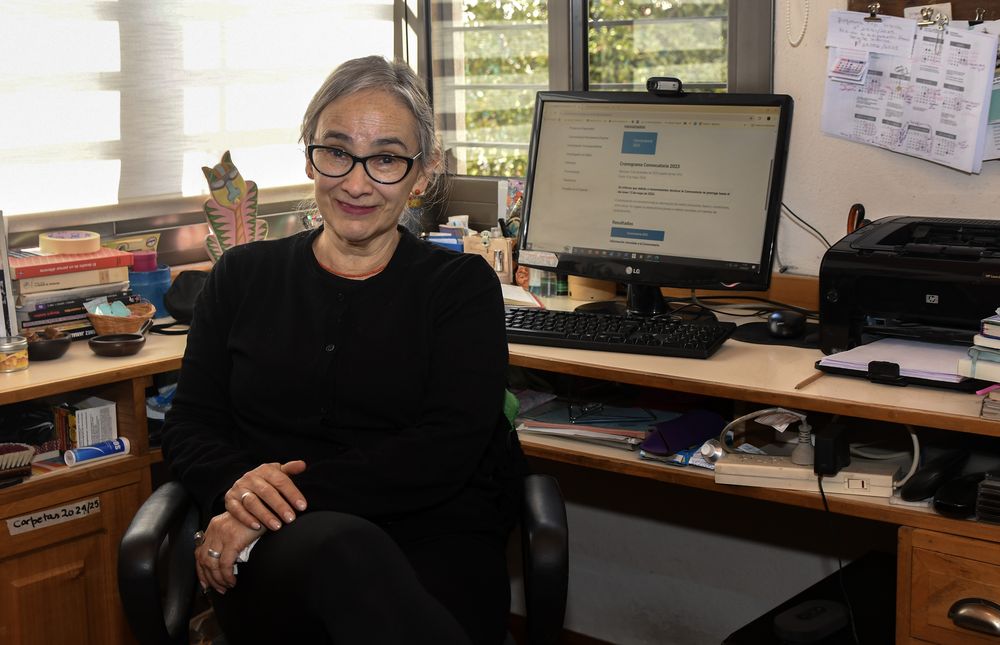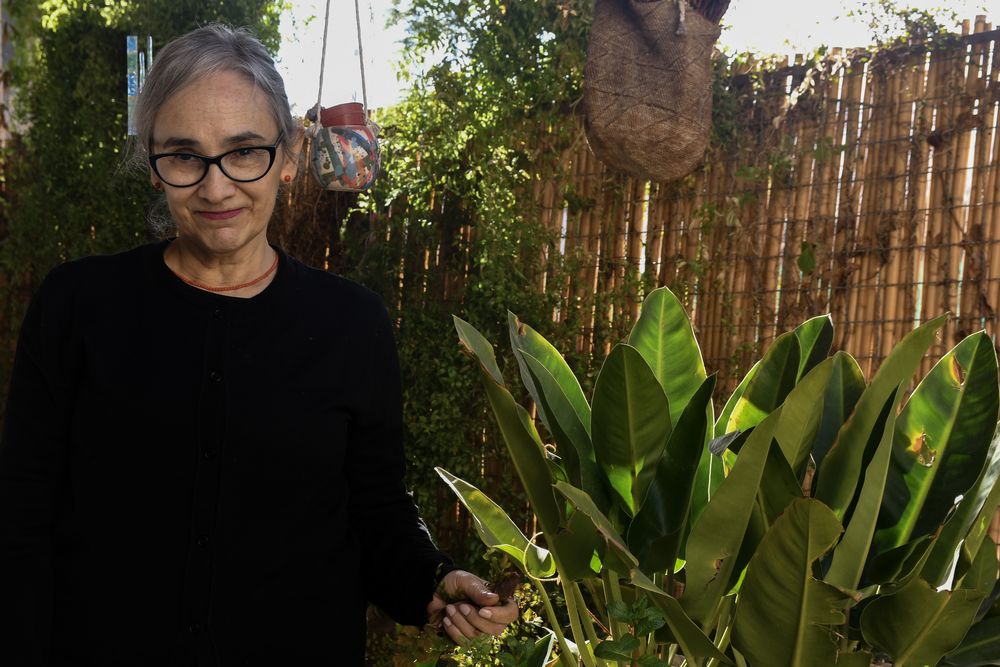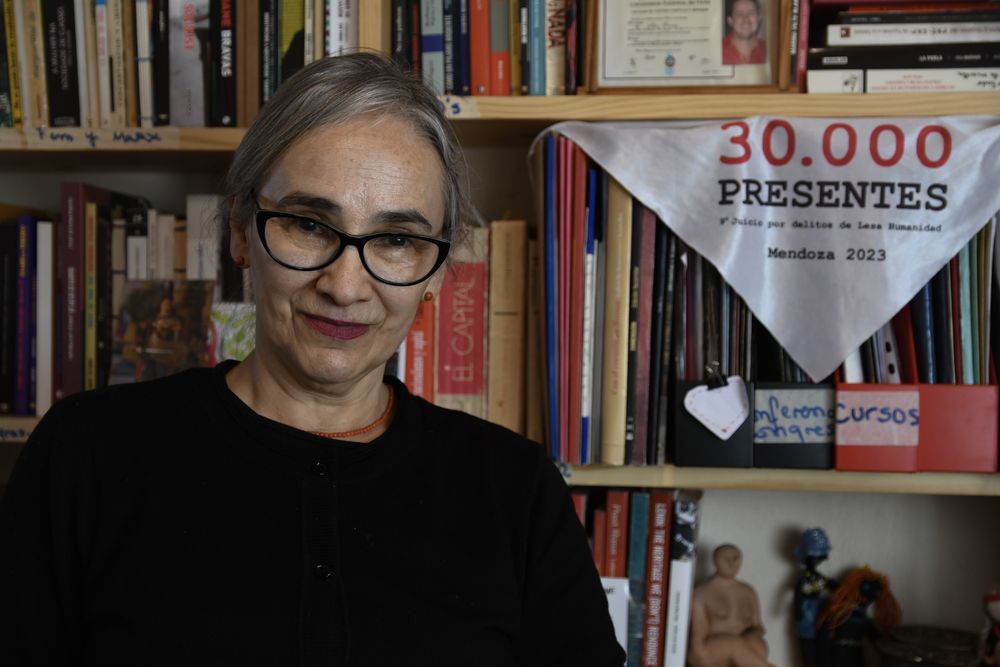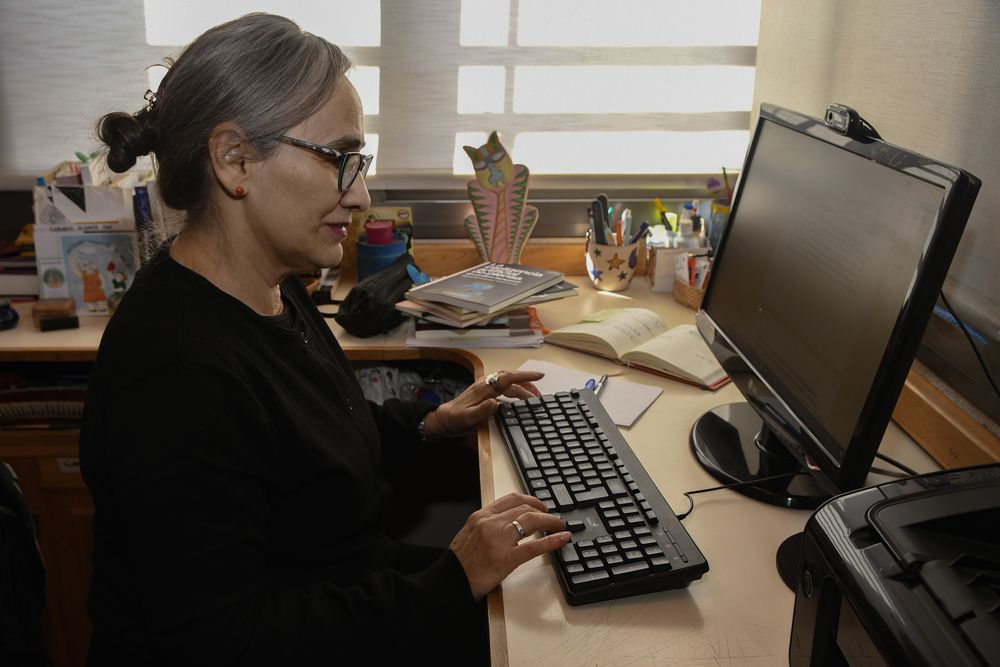Alejandra Ciriza, renowned social scientist: "The politics of cruelty leads us to horrible situations."

"Plants are very important in the lives of human beings and in the lives of all living beings," says Alejandra Ciriza as she prepares herbal tea on the porch of her home. A mother of two sons and a daughter—"who are two different things"—and in a relationship for 50 years, the graduate and doctor in Philosophy is known for her academic contributions as a professor at the Faculty of Political and Social Sciences at UNCuyo , a researcher at Conicet (now retired), a human rights activist , and a feminist activist .
Alejandra Ciriza (3)

Ramiro Gómez / Los Andes
" I've always been intensely interested in reading, and from a very young age, I knew I wanted to dedicate myself to philosophy. My professional career is practically a biography of Conicet, which I entered in 1985. It was Professor Arturo Roig who trained me in the field of scientific research when he returned from exile, " she recalls. Likewise, domestic tasks are fundamental for this woman who, in addition to building a family, specialized in feminist studies and genealogies of South America , becoming an essential reference .
It's a sunny and quiet morning in Alejandra Ciriza's home. Her living room features sculptures and prints by her daughter Martina, paintings by her brother, travel souvenirs, many books, and a setting as warm and friendly as she is. In the hallway in front of her desk, there's a photograph of her mother, her white shoes, and a necklace that also belonged to her. Hanging from her bookcase are two purple brooms, the green scarf for legal, safe, and free abortion, and small images that represent her.
Alejandra Ciriza (13)

Ramiro Gómez / Los Andes
A philosophical intellectual and committed teacher , the director of the Master's in Feminist Studies at UNCuyo received the Latin American and Caribbean Prize for Social Sciences (CLACSO) in June of this year in Bogotá, Colombia, in recognition of her academic career and her valuable contribution to the development of critical thinking . "This recognition made me ambivalent given the current context. Because while I have worked hard throughout my life, there was also an institution, Conicet, that supported the possibility of me dedicating myself to research," she notes.
-Conicet is a very fragile system because, unlike in other Latin American countries, where it's incorporated into universities, in Argentina—as in France—the system is separate from them. It's also a relatively small, highly specialized institution, and that makes it fragile because it's very easy to override us. The current situation is critical due to budget cuts, the stigmatization of certain lines of research, and a particular focus on the Social Sciences and Humanities, especially if they're not profitable.
-Do you think the political intention is to paralyze scientific research?
The current ruling class's idea of scientific research is that of people who never lived through such a system. The government's belief is that the state shouldn't invest in research, nor should public science exist. In any case, they assume that private companies should fund it. The truth is that Argentina has the most recognized public science system in Latin America, and until now—because they are working to destroy it—the most recognized. If you look at the rankings, which they are so interested in, Argentina has three Nobel Prize winners in science (Bernardo Houssay in Medicine (1947), Luis Federico Leloir in Chemistry (1970), and César Milstein in Medicine (1984). That should lead us to believe that public science has some importance. I think the politics of cruelty leads us to truly horrible situations.
-Why is it important to fund and sustain public science?
-First, it's important because public and dignified science produces knowledge that a corporation would never subsidize. Monsanto and the companies that fund GMO research do so because it means profit. No one would have funded glyphosate research like that of scientist Andrés Carrasco because it calls into question the commodification of knowledge. Conducting research is not the same as desiring it. Research is a rigorous life project that requires committed human labor.
Alejandra Ciriza (10)

Ramiro Gómez / Los Andes
-What place does Artificial Intelligence occupy in scientific research?
Artificial Intelligence doesn't think; it's a processor and a product of a binary system of thought that can produce biased and racialized knowledge. AI data is uploaded by thousands of humans who believe it's innocent and perform unpaid labor for capital. Furthermore, AI causes tremendous environmental damage because these processors consume more energy than entire countries. Human labor isn't registered as an important part of life globally, and that's why we live in a society that despises domestic work and believes a desirable social order will descend from above.
-During the recent naval expedition, Conicet took on an unusual role. How did you experience that historic crusade?
I know the system intimately because I was part of it for 40 years, and it doesn't surprise me because I know the work behind it, with trained biologists at all levels, from fellows to assistant, adjunct, independent, principal, and senior researchers. However, those programs are being interrupted. In 2024, there were no calls, and those who were admitted to the research program in 2022 have not yet been incorporated. Furthermore, those who applied in 2023 are unaware of the results of the call. For a science and technology system to work, there must be continuity and respect.
-How do you experience the differences of opinion on the issues that bring you together?
I think it's important to listen to what other people think, because otherwise it's all a monologue. It's valuable to give ourselves the opportunity to discuss and discern, because that makes us more human. In philosophy, questions are central, and in the field of philosophy, they don't have a single answer. That critical perspective is there, as is knowing that joy must be conquered every day, despite disagreement.
What have been your main contributions to being recognized in the scientific field by an institution like CLACSO, which brings together more than 800 research and graduate centers in Latin America and the Caribbean?
I think approaching feminism from "Our America" perspective, with a historical perspective, is a point of view that has a lot to do with the philosopher and historian Arturo Roig, my teacher and advisor. I began writing histories of 19th-century Latin American ideas, and my first great love in this research was a project on Manuela Sáenz (an Ecuadorian patriot and soldier, renowned for her participation in the independence of South America and companion of Simón Bolívar). At the time, material was very scarce, and I was fortunate enough to be invited to teach a course by the Simón Bolívar Andean University. When I went, I took the opportunity to bring back countless copies of archives that weren't available in Argentina: it was a different time, and there was no internet.
-When did you know you were a feminist?
When I read Simone de Beauvoir at the age of 16, I was able to find a name for my malaise. My mother instilled in me a devotion to books, and my father instilled in me the need to pursue a university education to become an independent professional. I was fortunate enough to study philosophy while my son was cared for in the university nursery. In relation to my work, I have placed a special interest in South American feminist genealogies, building on this concept as I conducted specific research. The construction of a dominant history of feminism has led us to ignore relevant figures such as Alicia Moreau, Angélica Mendoza, and Florencia Fossatti, to mention three examples.
The problem is that grand narratives are constructed in centers of power and intellectual production. To cite one example, Betty Friedan is considered an important feminist, when in fact she was a racist. I like to think about these genealogies because they are contentious and complex. A feminist genealogy is a storyline in which you recognize yourself, and it doesn't imply that these women designated themselves that way.
-In which plot do you recognize yourself?
I recognize myself in a very frayed plot because it's difficult to recover those memories. I also recognize myself in the plot that includes Manuela Sáenz and, in the 20th century, Lélia González, who has one of the most wonderful texts on Black feminism without being American. Racism in Latin America is related to racial mixing and denies a very important part of our ancestry.
It also includes my Ranquel sister and Macacha Güemes, a highly intelligent conspirator who collaborated intensely with her brother in sustaining the guerrilla war in the north. My plot, of course, includes my sisters in life. Feminism at this historical moment has its deepest roots in the women of the Landless Movement, those who sustain life in the neighborhoods and those who fight daily against patriarchal violence. Feminism is not the fight for a single cause.
Alejandra Ciriza (1)

Ramiro Gómez / Los Andes
Alejandra Ciriza has published more than 70 works in national and international peer-reviewed scientific journals, cultural and popular magazines, edited three collective books, and written more than 30 book chapters in compilations published by renowned publishers. She has been a visiting researcher at the Maison de Sciences de l'Homme, Paris, France, for research stays on topics of interest to her.
She has been a visiting professor at prestigious Latin American and European universities. Regarding her work in human resources training and project management, she has supervised 41 undergraduate theses in social sciences and psychology, 16 graduate theses, and over 20 scholarship recipients from national institutions. She is active in university outreach and outreach. She is an activist in feminist and human rights organizations.
Table tennisWhat concepts and values are central to your work and life? The recognition of my ancestors, my maternal grandmother, and the feminist genealogies I research. The care of nature and water. The importance of all life, human and animal. Also, the ideas of dignity, justice, equality, and freedom.
-A favorite quote? A quote from my sister, Sofia D'Andrea, "through the roughness to the stars."
-If you weren't a teacher and researcher, what would you be? A gardener.
-Is everything political? Everything.
-A pending goal and three influential feminists from a theoretical perspective? Recovering writings and writing a book of my own. I would think a lot about someone who helped me think through issues I hadn't thought of before, like Yuderkys Espinosa, Claudia Korol, and Sofía D'Andrea.
-The greatest lesson you learned from the historian and philosopher Arturo Roig? Considering archives, using a historical perspective to read everything, and understanding the provisional nature of knowledge. I learned patience and tolerance for frustration from him. He taught me a lot about the history of our America, and I owe him a lot.
-A healing plant? Lavender and violet.
losandes




